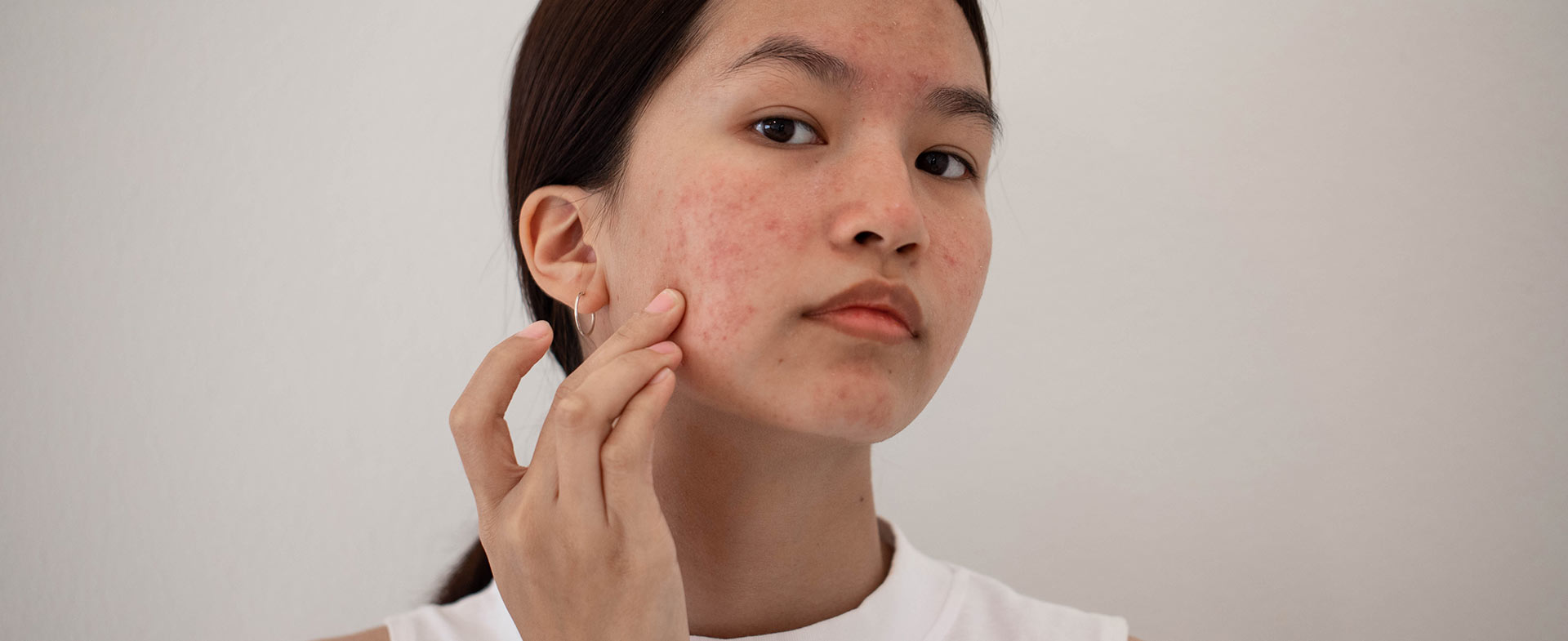Acne is a confusing condition. For years, many of us were told that diet has nothing to do with breakouts. It was strictly a skin condition, so we didn’t need to worry about what we ate.
New research, however, is turning the tables. Your gut, and the food you put in it, could influence acne after all. Here’s what we know about the connection between your gut and your skin, and how a healthy gut could help you minimize breakouts.
Can Your Gut Affect Your Skin?
Your gut microbiota consists of thousands of mostly friendly bacteria, fungi and viruses. Your microbiome (microbiota and the compounds they make) have many functions, including assisting your immune system and digesting your food into beneficial nutrients and compounds. They play a sort of “telephone game” when you eat:
- Food enters your gut and “talks” to the microbiome.
- Your microbiome takes the message from the food—whether good or bad—and sends it out into your bloodstream.
- The message travels to various organs, including your skin.
This process is designed to deliver essential nutrients and messages, but it can go awry if your gut sends a message loaded with inflammation. This often happens with ultra-processed foods, which are inflammatory and harm your microbiome’s delicate balance.
Ultra-processed foods lack the fiber and nutrients your beneficial microorganisms need to survive and thrive. Over time, the helpful bacteria decrease in number and harmful bacteria begin to dominate.
These bad bacteria eat away at your gut’s protective lining, allowing them unchecked access to your permeable gut wall. This condition, known as “leaky gut,” allows these unwanted invaders to enter your bloodstream and release toxins that can travel to your skin.
Once your immune system detects these foreign fragments, it triggers a system-wide inflammatory response. Your skin tries to defend itself from the invaders by increasing sebum (oil) and inflammatory pathways.
The result is acne breakouts. Often, acne with a gut-related cause is found across the face, rather than in a single area, such as the chin. You may also experience breakouts on your chest or back.

Subscribe To Our E-Newsletter
Dairy, Hormones And Acne
You may have already heard that acne is linked to hormones, and this is true. And certain foods also affect your hormones, including those that trigger acne.
Skim milk can be a contributor to hormone-related acne. When the fat is removed from milk, many of the hormones are left behind, creating a milk that’s higher in hormones than its full-fat counterpart.
This concentrated hormonal signal can increase insulin signaling and activate growth factors, such as insulin-like growth factor-1 (IGF-1). These inflammatory signals can prompt your skin to produce more oil and cells more rapidly, which can lead to clogged pores.
Treating Acne Inside And Out
Acne has many causes and triggers, so no diet can guarantee clear skin. But if you might have inflammatory or gut-related acne, consider trying a two-part approach that combines diet with topical treatments.
1. Healing your gut to heal your skin
Improving your gut health starts with a comprehensive look at your entire lifestyle:
- Focus on gut-friendly foods: A healthy diet is the foundation for a healthy gut. Focus on whole plant-based foods, such as fruits, vegetables and whole grains. These provide the nutrients and fiber your beneficial bacteria need, which helps calm inflammatory pathways. Limit or avoid ultra-processed foods. Consider switching from skim milk to non-dairy “milks” and foods.
- Get enough sleep: Aim to get at least seven hours of sleep each night. A chronic lack of sleep can alter your gut’s delicate balance and increase inflammation and stress hormones in your body.
- Manage stress: Stress triggers a “fight or flight” response that can lead to inflammation and disrupt your microbiome. Finding healthy ways to manage it can make your gut happier.
2. Take advantage of topical treatments
Topical acne medications and a good skincare routine are an essential part of managing acne, too. Mild acne may respond well to over-the-counter products that contain:
- Adapalene, which fights inflammation and helps your skin shed old cells more efficiently
- Benzoyl peroxide, which can combat inflammatory bacteria in the skin
- Salicylic acid, which helps clear clogged pores and calm inflammation
If over-the-counter treatments aren’t enough, see a healthcare professional. Acne isn’t just a cosmetic issue—it can cause scarring and emotional stress. Options available from a medical provider include:
- Aesthetic procedures: Chemical peels, laser treatments and blue light therapy treat inflammation beneath the surface of your skin.
- Retinoids: Available in creams or gels, retinoids can speed up skin cell turnover, unclog pores and calm inflammation.
- Topical antibiotics: Often prescribed as a cream or pre-soaked cotton pads, these medicines kill acne bacteria and calm inflammation.
Combining gut health and topical treatments allows you to target acne from both the inside and the outside. This “sandwich approach” may be more effective than using one method alone.
Healthy Gut, Healthy Skin
Though many people think of skin problems as surface-level, they’re much more complex. Your skin reflects things that are happening inside your body. When you focus on a healthy microbiome, you can stop the inflammatory telephone game. Over time, this can set the stage for clearer skin.
Dr. M. Elizabeth Swenor leads the functional and lifestyle medicine team at Henry Ford Health. She sees patients at Henry Ford Medical Center in Bloomfield Township. Learn more about Dr. Swenor and read her articles here.



